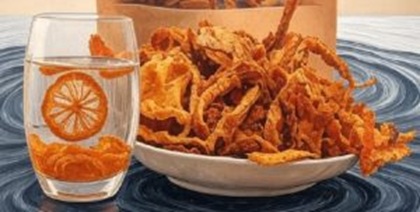Dried Tangerine Peel

Dried Tangerine Peel (Chen Pi): A Warming Herb for Digestion, Phlegm, and Qi Regulation
Introduction
Dried tangerine peel, known as Chen Pi (陈皮) in Traditional Chinese Medicine (TCM), is a widely used aromatic herb prized for its ability to regulate Qi, harmonize digestion, and transform dampness and phlegm. Aged tangerine peel is considered more potent, with a warming nature that supports the Spleen and Lungs. Its mildly bitter and pungent flavor makes it an essential ingredient in herbal formulas and Chinese soups—especially for bloating, poor appetite, or excess mucus.
What Is Dried Tangerine Peel?
Chen Pi is made from the sun-dried peel of mature tangerines (Citrus reticulata). The peels are often aged for several years to deepen their aroma and enhance their medicinal effects. In TCM, Chen Pi is classified as warm, bitter, and acrid, and it enters the Spleen, Lung, and Stomach meridians. It is known for moving Qi, resolving dampness, and drying phlegm, making it especially effective in digestive and respiratory disorders involving stagnation.
Health Benefits of Dried Tangerine Peel
1. Regulates Qi and Relieves Bloating
Chen Pi is known for its ability to move stagnant Qi in the digestive system. It relieves symptoms like abdominal bloating, fullness, nausea, and belching.
2. Strengthens the Spleen and Improves Digestion
It enhances digestive function, especially in those with sluggish digestion or damp accumulation.
3. Dries Dampness and Resolves Phlegm
It helps dry excessive mucus and dampness in the lungs and stomach, useful for cough with phlegm, sinus congestion, and post-meal heaviness.
4. Enhances the Effectiveness of Other Herbs
Chen Pi helps harmonize and guide other herbs in a formula, improving absorption and the overall effect.
5. Mildly Calms the Mind and Uplifts Mood
Its citrusy aroma has been used to uplift the spirit and ease mild tension or irritability related to Qi stagnation.
How to Use Dried Tangerine Peel
1. In Soups and Congee
Add 3–6 grams of aged Chen Pi to herbal soups, broths, or congee to aid digestion and reduce bloating. Often paired with ingredients like ginger, Chinese yam, and pork.
2. In Herbal Decoctions
Simmer Chen Pi with other herbs in digestive or anti-phlegm formulas such as Er Chen Tang. It enhances the warming and harmonizing qualities of the tea.
3. In Teas
Steep a small piece with hot water, sometimes alongside hawthorn berries, ginger, or Pu-erh tea for a post-meal digestive brew.
4. As a Culinary Spice
Ground Chen Pi is used in Chinese cooking to add fragrance and flavor to meat dishes, marinades, and desserts.
Where to Buy Dried Tangerine Peel
You can find Chen Pi at Chinese herbal pharmacies, Asian grocery stores, or online shops like iHerb, Amazon, and TCM specialty stores.
Look for:
- Well-aged (darker, more aromatic) peels
- Organic or chemical-free sources
- Whole or sliced pieces with a firm, leathery texture
Are There Any Side Effects?
Chen Pi is generally safe and gentle. However, people with extreme yin deficiency or dry heat conditions should use it cautiously. Overuse may lead to dryness or irritability, especially when combined with too many warming herbs.
Conclusion
Dried tangerine peel (Chen Pi) is a trusted TCM herb and kitchen staple that blends medicinal power with culinary charm. Its warming and Qi-regulating properties make it ideal for treating bloating, mucus, indigestion, and sluggish energy. Whether simmered in soup or steeped in tea, Chen Pi is a simple, effective herb for daily digestive support.
FAQs
Can I eat Chen Pi on its own?
Not usually—it’s quite bitter. It’s best cooked in teas or soups, or ground as a spice.
How long should Chen Pi be aged?
The longer, the better. Three to ten years is ideal for deeper aroma and effectiveness.
Is Chen Pi good for colds?
Yes, especially if there is phlegm congestion or digestive sluggishness accompanying the illness.

